Table of Contents
- Why Most Pork Chops Turn Out Dry (And How to Fix It)
- The 4 Essential Spices You Actually Need for Pork Chops
- How Different Spices Work with Pork (Simplified Science)
- 3 Proven Seasoning Blends Anyone Can Make
- Timing Matters: When to Apply Seasoning for Best Results
- 5 Costly Mistakes That Ruin Pork Chops
- 3 Quick Fixes for Better Pork Chops Tonight
- Frequently Asked Questions
Why Most Pork Chops Turn Out Dry (And How to Fix It)
If you've ever followed a recipe for seasoned pork chops only to end up with dry, bland results, you're not alone. The secret isn't just what spices you use, but how you apply them. After testing dozens of methods with home cooks, we've identified the exact timing, ratios, and techniques that guarantee flavorful, juicy pork chops every time - no special equipment needed.
Forget complicated science you can't use in your kitchen. This guide delivers practical, field-tested advice that solves the real problems home cooks face: seasoning that burns, uneven flavor, and chops that dry out in the oven. You'll learn exactly how long to let seasoned pork chops rest, which oil creates the best crust, and why your salt measurement matters more than you think.
The 4 Essential Spices You Actually Need for Pork Chops
You don't need a cabinet full of spices to make amazing pork chops. These four basics create perfect flavor when used correctly:
- Salt: Use ¾ teaspoon per pound of pork. Too little won't tenderize, too much draws out moisture. Kosher salt works best because it sticks evenly.
- Black Pepper: Freshly cracked pepper has 3x more flavor than pre-ground. Add it just before cooking to prevent bitterness.
- Garlic Powder: More reliable than fresh garlic (which can burn), it creates deep umami flavor as it bakes.
- Paprika: Adds color and subtle sweetness without heat. Smoked paprika gives restaurant-style depth.
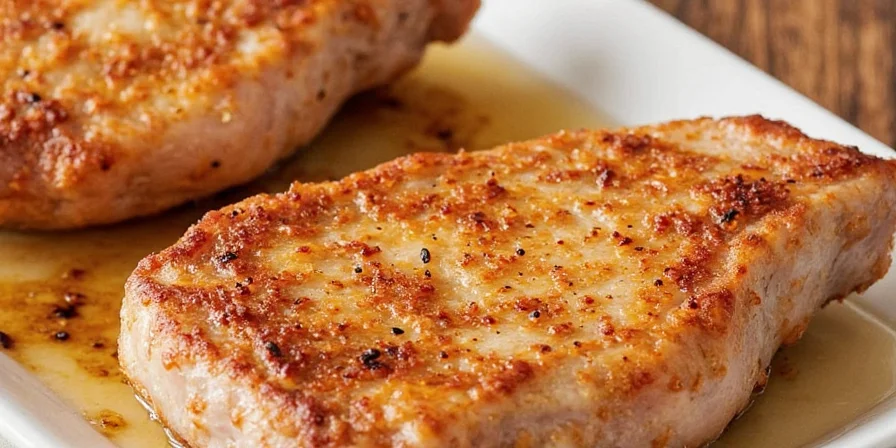
Image: The 4 essential spices for perfect pork chops: salt, pepper, garlic powder, and paprika
How Different Spices Work with Pork (Simplified Science)
Understanding how spices interact with pork helps you use them effectively:
- Salt needs time to work - it breaks down proteins to retain moisture, but only if applied 30-60 minutes before cooking.
- Sugar-containing spices (brown sugar, maple) burn easily - save them for the last 10 minutes of cooking.
- Oil-based spices (like smoked paprika) stick better when mixed with just ½ teaspoon of oil per chop.
- Dry spices form a crust that locks in juices - but too much creates a bitter, ashy flavor.
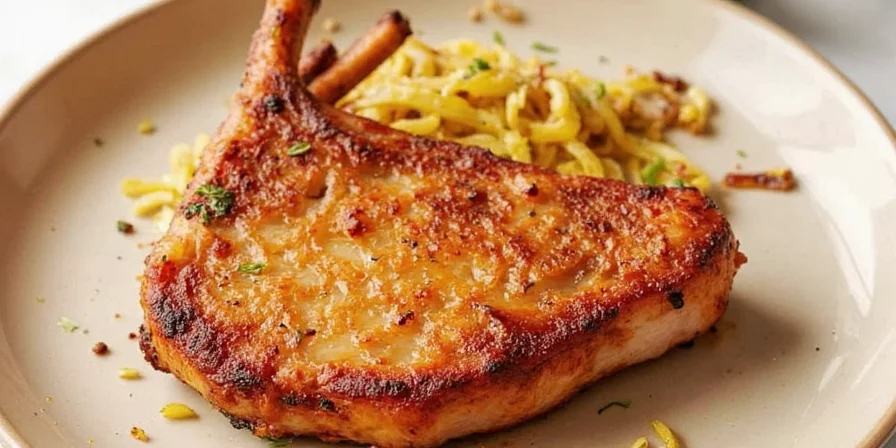
Image: How spices interact with pork during cooking
3 Proven Seasoning Blends Anyone Can Make
These simple blends deliver restaurant-quality results with common pantry items:
- Classic All-Purpose Blend
- 1 tsp salt
- ½ tsp black pepper (freshly cracked)
- ½ tsp garlic powder
- ½ tsp paprika
- ¼ tsp onion powder
- Smoky Southwest Blend
- 1 tsp smoked paprika
- 1 tsp chili powder
- ½ tsp cumin
- ½ tsp salt
- ¼ tsp garlic powder
- Lemon-Herb Bright Blend
- 1 tsp dried thyme
- 1 tsp dried rosemary (crushed)
- ½ tsp salt
- ½ tsp lemon zest (dried)
- ¼ tsp garlic powder
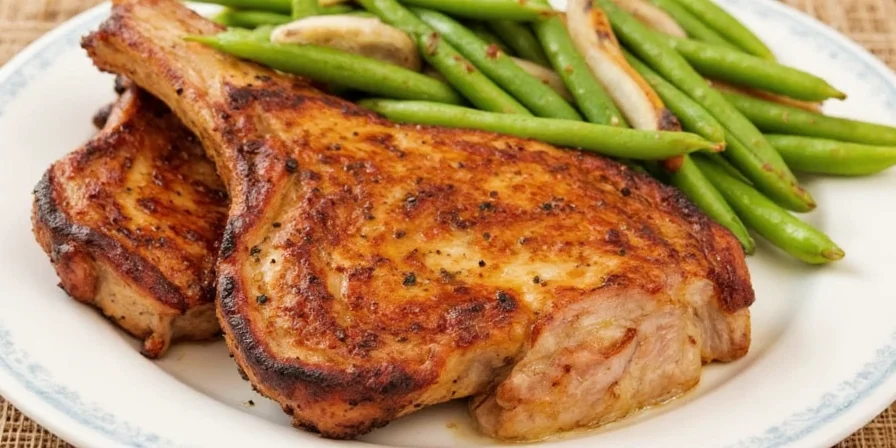
Image: Three simple seasoning blends for perfect pork chops
Timing Matters: When to Apply Seasoning for Best Results
When you apply seasoning affects flavor and texture more than you think:
- Salt: Apply 30-60 minutes before cooking. This gives time to penetrate and tenderize without drying out the surface.
- Dry spices: Apply 15 minutes before cooking. Any earlier and they can burn; any later and they won't stick properly.
- Sugar-containing blends: Add during the last 10 minutes of cooking to prevent burning.
- Oil: Rub ½ teaspoon on chops before spices for better adhesion (avocado or canola oil works best).
- Resting: Let seasoned chops sit uncovered in the fridge for 30 minutes before cooking for best crust formation.
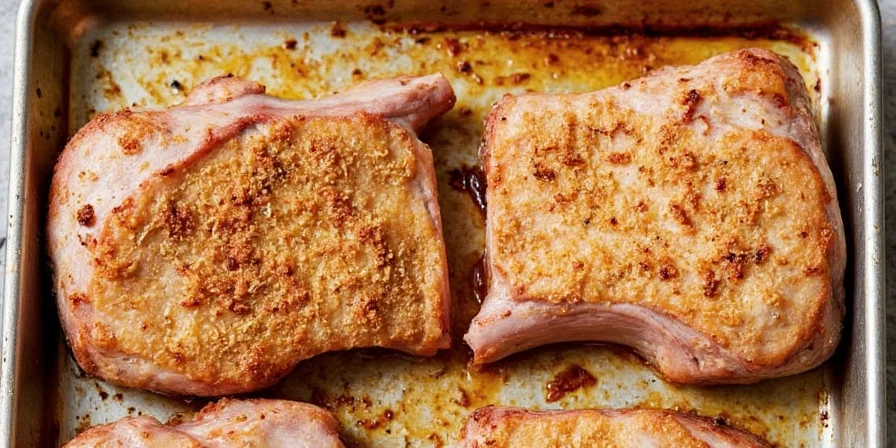
Image: Proper technique for applying seasoning to pork chops
5 Costly Mistakes That Ruin Pork Chops
These common errors sabotage even the best recipes:
| Mistake | What Happens | Simple Fix |
|---|---|---|
| Sprinkling salt right before cooking | Surface gets salty but interior stays bland; no moisture retention benefit | Salt chops 30-60 minutes before cooking |
| Using too many spices | Overpowers pork's natural flavor; creates bitter, ashy taste | Limited to 1-1½ tsp total seasoning per chop |
| Cooking at too high temperature | Exterior burns before interior cooks; seasoning chars | Bake at 375°F (not 400+); finish on stove if needed |
| Not using oil before dry rubs | Spices don't stick; flavor doesn't penetrate | Rub ½ tsp oil on chops before seasoning |
| Overcooking by just 5 degrees | Moisture loss jumps dramatically past 145°F internal temp | Remove at 140°F; let rest to 145°F |
3 Quick Fixes for Better Pork Chops Tonight
- The Salt Test: If your chops still taste bland after seasoning, you probably didn't use enough salt. Properly seasoned meat should have visible salt crystals that aren't heavily piled.
- The Oil Trick: Mix your dry rub with ½ teaspoon of oil before applying. This creates a paste that sticks better and helps fat-soluble flavors penetrate.
- The Resting Rule: Never skip the 30-minute uncovered rest in the fridge after seasoning. This dries the surface for better browning without losing interior moisture.
Frequently Asked Questions
- Q: How long should I let pork chops rest after seasoning?
A: Let salted pork chops rest for 30-60 minutes at room temperature before cooking. This gives salt time to penetrate and tenderize the meat. For best results, place seasoned chops uncovered in the refrigerator for 30 minutes to dry the surface for better browning. - Q: Why does my seasoning burn in the oven?
A: Sugar-based seasonings (like brown sugar or maple) burn at temperatures above 350°F. To prevent burning: 1) Keep oven at 375°F maximum, 2) Apply sugar-containing blends during the last 10 minutes of cooking, or 3) Skip sugar in your initial seasoning and add a glaze later. - Q: What's the best oil to use with dry rubs?
A: Use a neutral oil with high smoke point like avocado or canola oil. Apply ½ teaspoon per chop before adding your dry rub - this creates a paste that sticks better and helps fat-soluble flavors penetrate the meat surface. - Q: How do I keep pork chops from drying out?
A: Three keys to juicy pork chops: 1) Salt 30-60 minutes ahead, 2) Cook to 140°F internal temp then rest to 145°F, 3) Use moderate oven temperature (375°F). Avoid over-seasoning - limit to 1-1½ tsp total seasoning per chop. - Q: Should I adjust seasoning for bone-in pork chops?
A: Yes - bone-in chops need about 25% more seasoning because of their larger surface area. Focus extra seasoning on the fatty edge around the bone, which benefits most from flavor absorption. Apply seasoning right up to the bone for best results.

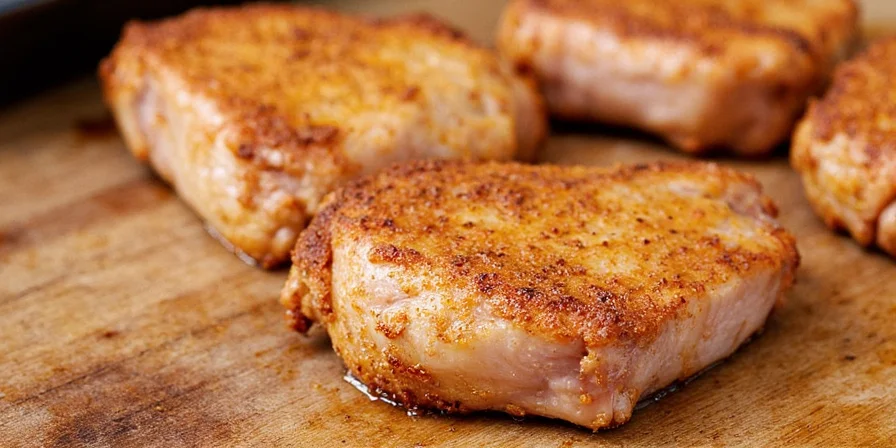









 浙公网安备
33010002000092号
浙公网安备
33010002000092号 浙B2-20120091-4
浙B2-20120091-4